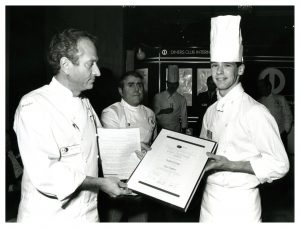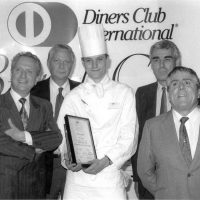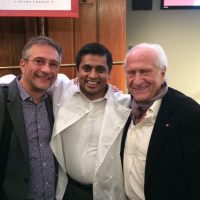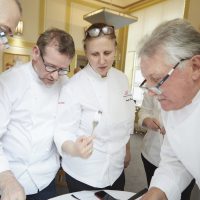The rise and rise of British chefs
How the Roux Scholarship put British chefs on the culinary map, by Amanda Afiya
The UK’s culinary landscape is in magnificent health. Temples of gastronomy run the length and breadth of the country, and acclaimed international chefs applaud our land for the diversity of cuisines it offers.
But this hasn’t always been the case. In 1974, Michelin published its first guide to Britain since WWII and awarded 25 restaurants with stars. Having re-established itself in the marketplace, the guidebook started to pick up momentum, but credible restaurants were few and far between and so in 1984, when a 20-year-old Andrew Fairlie won the first Roux Scholarship, the UK’s culinary reputation on the world stage was still the butt of all jokes. Few gourmet travellers visited our shores for a culinary tour – most restaurants simply weren’t ‘worth a detour’.
The new competition presented its inaugural winner with a once-in-a-lifetime opportunity – an unprecedented stage in the kitchens of one of the world’s finest chefs, Michel Guérard of Les Près d’Eugénie in south-west France. The Scholarship’s creators, Albert and Michel Roux, could unlock the most revered of restaurant doors.
Despite his young age, Fairlie had had is eyes on honing his craft on the Continent, but up until his success in the Scholarship, the response from French chefs had been a resolute ‘non’. British chefs working in French kitchens were scoffed at.
It was for this reason that Albert and Michel Roux first created the competition. Knowing that restaurants of gastronomic standing were only peppered throughout the UK, and therefore the opportunity for native chefs to train in them limited, the brothers hoped that their competition would become a beacon for British talent, inspire more young chefs to raise their game, and change the perceptions European chefs had of our country’s cuisine.
It was a ground-breaking concept and one that launched with tons of integrity. Michel and Albert were admired the world over; in 1982 Le Gavroche had become the first restaurant in the UK to be awarded three Michelin stars, while the Waterside Inn, then on two stars, would go on to match Le Gavroche’s status in the Scholarship’s second year.
The brothers anticipated that the competition would equip their scholars with the skills to one day create their own businesses, and, over the past 40 years, nearly half have gone on to run their own restaurant or consultancy. Meanwhile, today nine scholars hold Michelin stars in their own right, and three of those nine – Andrew Fairlie, Sat Bains and Mark Birchall, who opened Moor Hall in Aughton, Lancashire, in early 2017 – hold two.
Critically, the hospitality industry’s most exacting culinary competition centres around the solid foundations required to make a great chef. While the early stages of the competition see competitors presenting their own recipes, the final, while leaving a little room for modern interpretation, is a test of both theory and technique of a classical kind. Working from Roux family recipes, typically inspired by Auguste Escoffier or Antonin Carême, competitors require a working knowledge of traditional French cooking methods, a calm head and an exceptional palate.
Open to chefs under 30 who are working professionally in the UK, it is open to everyone: whether they are working in fine-dining restaurants, hotels, food service, pubs or cafes, if a chef has the talent and ambition to enter, practise and shine in the regional and national finals, anyone can be a winner.
And while everyone clearly aims to win, chefs have increasingly realised that a place in the regional heats is incredibly beneficial too.
For the overall victor, however, they will quickly learn that the three-month stage, which they can take at any three-Michelin-starred restaurant in the world, is just the start of their journey with the Roux family and the Roux Scholarship, now jointly chaired by Michel Jr and Alain. In addition to their stage and up to £12,000 to support their career development, they also receive essential tools for their craft and an all-expenses-paid trip to the wine cellars of Laurent-Perrier at Tours-sur-Marne, among a bounty of prizes. By becoming a Roux Scholar, chefs join an elite club of unparalleled opportunities.

Amanda Afiya is communications consultant, journalist and former editor of The Caterer



